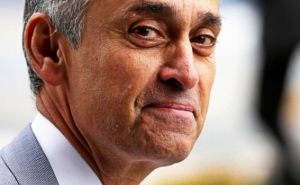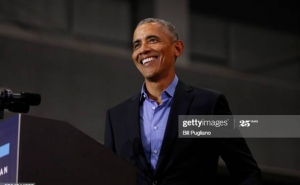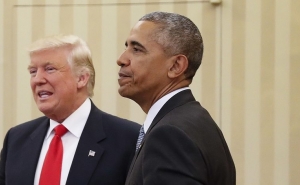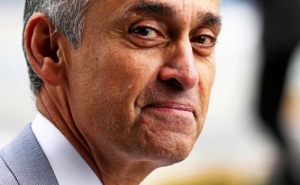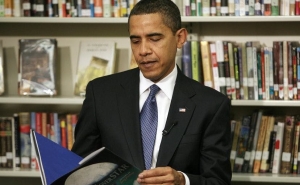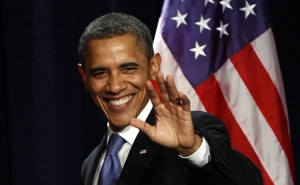The Word Genocide and US Presidents

"Mr. President, don’t turn your back. Recognize Armenian Genocide," thousands of posts with the following words every year on April 23 appear in many US Armenian-populated cities.
It is common knowledge that the international recognition of Genocide largely depends on its recognition by the United States. Although, for example, the US 40th president, Ronald Reagan, at a time pronounced the word "Genocide," nothing has changed, because the recognition of Genocide by the USA depends on the decision of the executive body.
Starting from the US 42nd president Bill Clinton there have been a tradition: each year on April 24 the US president issues a statement on the Armenian Genocide. Since 1994 up to present already three US presidents every year on April 24 labeled Armenian Genocide in by any term, but not Genocide.
Bill Clinton started to speak not of the very Genocide, but of the development opportunities for the Republic of Armenia, of the Armenian –Turkish rapprochement, even of the peaceful resolution of the Karabakh conflict and of the US being utmost use to Armenia.
Successor of Clinton, president George Bush before becoming a president promised the Armenian community in case of being elected to call the things by their names and to call the 20th century tragedy Armenian Genocide. However after getting the support of the Armenian community George Bush throughout the whole period of his tenure, was not loyal to his promise and called the Armenian Genocide "mass killings", "massacres", "crime against humanity", "great calamity" etc.
It is important to note that the statements also contained no information about the organizers and committers of the crime. There were mentioned only time and place.
In diplomacy this is called "maneuvering discourse," when the events are described in non-direct and equivocal language; the one that avoids the expressions that assume next steps. Instead of event descriptors there are general estimations and emotional expressions. In such kind of speech all the addressees in case of willingness can find points of their interest. Such kind of discourse neither rejects nor confirms Genocide. However such a discourse has a far-reaching goal not rejecting avoid recognition, in any case becoming an obstacle to recognition.
The US 44th president Barack Obama, who often called Genocide the massacres committed by Turkey when acting as a senator, after becoming a president not only preserved the main form of the statements used by his predecessors, but moreover improved it.
Obama made his April 24 statements more diverse and ambiguous directed to different addressees and assuming contradictory interpretations. On April 24, 2010 in his statement Obama said: "It is a devastating chapter in the history of the Armenian people, and we must keep its memory alive in honor of those who were murdered and so that we do not repeat the grave mistakes of the past."
Now it is already six years, that the Armenians in the US and all over the world especially on the eve of April 24 ask Barak Obama to keep his promise and to at least that year recognize Armenians Genocide. However, the US president’s advisers seem to find new words and expressions each year to continue their high level maneuvering discourse and policy. The same situation we witnessed this year as well.
Other materials on this subject
- Australia MP Joins Demand for Armenian Genocide Recognition A former Mayor of the Bega Valley Shire, McBain entered Federal Parliament in 2020 after winning a by-election. A lawyer by training, Kristy McBain becomes the newest member of the Joint Justice Initiative.
- Quebec National Assembly Unanimously Passes Resolution on 106th Anniversary of Armenian Genocide The resolution marks the 106th anniversary of the atrocities that took the lives of 1.5 million Armenian men, women and children.
- Armenian Churches’ Bells to Ring Friday Night in Memory of Genocide Victims The bells of all the temples of the Armenian Church will ring on Friday at 11pm, in memory of the holy martyrs of the Armenian Genocide.
- Los Angeles Declares April as Armenian History Month One of the motions recognizes April 24 as the Day of Remembrance in solemn recognition of the Armenian Genocide, and the second declares April as Armenian History Month.
- Wall Street Journal: Biden Intends to Recognize Armenian Genocide Biden is expected to describe as genocide the deportation, starvation, and massacres of Armenians at the hands of the Ottoman Turks beginning in 1915, the officials said.
Other materials on this subject
- Turkey is sending Cold War-era cluster bombs to Ukraine – FP The weapons are designed to destroy tanks by bursting into smaller submunitions, which can linger on the battlefield for years if they do not immediately explode. Each round scatters about 88 bomblets.
- Los Angeles mayor and city council president address US president on Lachin corridor issue Thank you, Mayor Bass, for joining me in communicating to President Biden the urgent need for U.S. leadership to lift the blockade and bring humanitarian relief to the people of Artsakh.
- US Committed to Helping Armenia and Azerbaijan Resolve Issues Peacefully: Blinken Spoke With Pashinyan The Secretary reiterated our commitment to helping Armenia and Azerbaijan resolve issues peacefully.
- Iran to Submit Final Conclusion Over Nuclear Deal Revival by Midnight In comments on Monday, Amirabdollahian said Iran is going to send its final conclusion about the JCPOA talks to the European coordinator in written form at midnight.
- Erdogan, Biden Might Meet in September- Media Turkey plans to buy 40 F-16 fighter jets from the US and upgrade another eighty. US President Joe Biden stated that he expects to receive the approval of the [US] Congress to sell F-16 fighter jets to...
-
 17:08
17:08The regular session of the Anti-corruption Policy Council takes place in Jermuk
-
 15:05
15:05The Prime Minister sends congratulatory messages to the supreme leader of Iran and the President of Iran
-
 11:11
11:11Armenia sends earthquake aid to Turkey
-
 10:43
10:43Commemoration of the Pontiff St. Sahak Partev
-
 09:16
09:16Some roads are closed and difficult to pass in Armenia
-
 19:55
19:55Phone conversation of the Foreign Minister of Armenia with the U.S. Assistant Secretary of State for European and Eurasian Affairs
-
 18:30
18:30Prime Minister Pashinyan and President Khachaturyan meet
-
 18:20
18:20Ararat Mirzoyan with Co-Chairman of the OSCE Minsk Group of France Brice Roquefeuil
-
 17:01
17:01Humans could land on Mars within 10 years, Musk predicts
-
 16:45
16:45France, US urge 'immediate' end to Nagorno Karabakh blockade
-
 16:01
16:01Blockaded Nagorno Karabakh launches fundraiser to support quake-hit Syria
-
 15:59
15:59Earthquake death toll in Turkey rises to 18,342
-
 15:43
15:43Ararat Mirzoyan Held a Telephone Conversation with Sergey Lavrov
-
 15:06
15:06French president rules out fighter jet supplies to Ukraine in near future
-
 14:47
14:475 Day Weather Forecast in Armenia
-
 14:44
14:44President Vahagn Khachaturyan wrote a note in the book of condolences opened in the Embassy of Syria in Armenia
-
 14:20
14:20Azerbaijan’s provocations impede establishment of peace and stability – Armenian FM tells Russian Co-Chair of OSCE MG
-
 12:57
12:57France representation to OSCE: Paris calls on Azerbaijan to restore freedom of movement through Lachin corridor
-
 11:40
11:40Command of Kosovo forces highly appreciated preparation of Armenian peacekeepers
-
 10:16
10:16The United States withdrew from sanctions against Syria for six months the provision of assistance after the earthquake
day
week
month
Humidity: %
Wind: km/h


